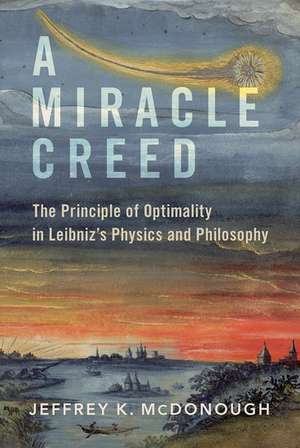A Miracle Creed: The Principle of Optimality in Leibniz's Physics and Philosophy
Autor Jeffrey K. McDonoughen Limba Engleză Hardback – 29 apr 2022
Preț: 435.97 lei
Preț vechi: 484.48 lei
-10% Nou
Puncte Express: 654
Preț estimativ în valută:
83.44€ • 86.79$ • 69.93£
83.44€ • 86.79$ • 69.93£
Carte disponibilă
Livrare economică 10-15 februarie
Preluare comenzi: 021 569.72.76
Specificații
ISBN-13: 9780197629079
ISBN-10: 0197629075
Pagini: 250
Ilustrații: 21 illus.
Dimensiuni: 149 x 216 x 22 mm
Greutate: 0.42 kg
Editura: Oxford University Press
Colecția OUP USA
Locul publicării:New York, United States
ISBN-10: 0197629075
Pagini: 250
Ilustrații: 21 illus.
Dimensiuni: 149 x 216 x 22 mm
Greutate: 0.42 kg
Editura: Oxford University Press
Colecția OUP USA
Locul publicării:New York, United States
Recenzii
An illuminating contribution to the histories of philosophy and science.
This book is an impressive and original contribution to the history of philosophy and to the history of science. When scholars discuss Leibniz's physics, it is almost exclusively his theories of motion and space and his dynamics. But McDonough is calling attention to altogether different corners of Leibniz's scientific interests, his optics, his treatment of rigid beams, his studies of hanging chains and falling bodies, all unified by his use of teleological principles. This is a book like no other in the Leibniz literature: it deserves to be widely read and studied
Leibniz' ideas are increasingly useful in modern fields of science as diverse as cosmology and biology. For a grand tour of Leibniz' physics and philosophy—and especially of the subtleties of teleology—there is no finer guide than Jeff McDonough. A Miracle Creed is insightful, even-handed, and crystal-clear. It is essential reading for anyone who cares about how we come to understand and explain our world.
This rich and penetrating study breaks new ground in our understanding of Leibniz's philosophy. McDonough demonstrates how the principle of optimality is a 'miracle creed' that drives Leibniz's investigations in optics, mechanics and statics, while closely integrating them with foundational doctrines of his metaphysics. Moving deftly between Leibniz's solutions to technical problems in physics and current interpretative debates, McDonough makes an original case for the systematicity and continued relevance of his thought. The book is a must read for anyone with interests in Leibniz's philosophy and the development of physical theory in the seventeenth and eighteenth centuries
The book not only provides an in-depth survey of important topics in Leibniz's philosophy and physics, it also succeeds in arguing that we should take optimality principles in physics more seriously.
This book is an impressive and original contribution to the history of philosophy and to the history of science. When scholars discuss Leibniz's physics, it is almost exclusively his theories of motion and space and his dynamics. But McDonough is calling attention to altogether different corners of Leibniz's scientific interests, his optics, his treatment of rigid beams, his studies of hanging chains and falling bodies, all unified by his use of teleological principles. This is a book like no other in the Leibniz literature: it deserves to be widely read and studied
Leibniz' ideas are increasingly useful in modern fields of science as diverse as cosmology and biology. For a grand tour of Leibniz' physics and philosophy—and especially of the subtleties of teleology—there is no finer guide than Jeff McDonough. A Miracle Creed is insightful, even-handed, and crystal-clear. It is essential reading for anyone who cares about how we come to understand and explain our world.
This rich and penetrating study breaks new ground in our understanding of Leibniz's philosophy. McDonough demonstrates how the principle of optimality is a 'miracle creed' that drives Leibniz's investigations in optics, mechanics and statics, while closely integrating them with foundational doctrines of his metaphysics. Moving deftly between Leibniz's solutions to technical problems in physics and current interpretative debates, McDonough makes an original case for the systematicity and continued relevance of his thought. The book is a must read for anyone with interests in Leibniz's philosophy and the development of physical theory in the seventeenth and eighteenth centuries
The book not only provides an in-depth survey of important topics in Leibniz's philosophy and physics, it also succeeds in arguing that we should take optimality principles in physics more seriously.
Notă biografică
Jeffrey K. McDonough is a Professor of Philosophy at Harvard University. His research focuses on the intersection of philosophy, science, and religion in the early modern era. He has written numerous articles on philosophy in the early modern period. His edited volume on the history of the concept of teleology, Teleology: A History was recently published by Oxford University Press (2020). He is currently at work on a textbook on the philosophy of religion entitled Saints, Heretics and Atheists: A Historical Introduction to the Philosophy of Religion also to be published by Oxford University Press.
